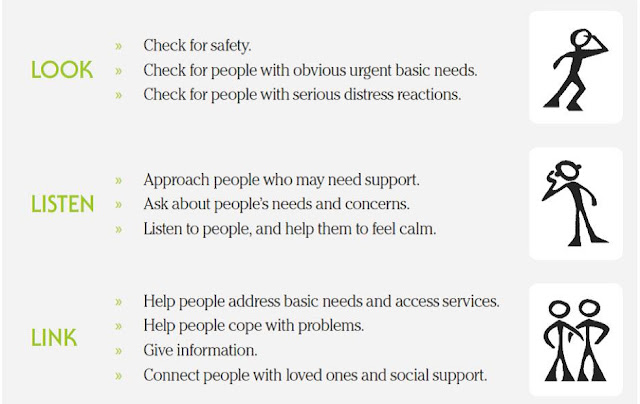So far I have been writing about the importance of compassion, and about the best ways of being positive. Now it’s time to think about what practical steps we can take to help a person in distress become more hopeful about their life.
Of course, a lot depends on how much knowledge and skill we possess. Doctors, psychologists and mental health nurses, for example, have access to drugs or therapeutic techniques, which aren’t available for others. Faith leaders and counsellors have status and training that can often be of particular benefit.
But we can all offer important, practical help.
Two well-tested things that anybody can offer are Mental Health First Aid, and Psychological First Aid. And then, with a little training, there’s Problem Management Plus.
Mental Health First Aid (MHFA) is helpful for anybody who is suffering from mental or emotional distress. This graphic shows you the five main ingredients:

So, for Darren, I’m there to assist with his crises, like when he gets his sickness benefit turned down. I’m always willing to listen to his concerns and his worries. I give him information about courses and things he could do to improve his drumming skills. I offer him the choice of seeing the mental health team, and I encourage him to keep in touch with his friends even after they’ve had arguments.
If you want to find out more about MHFA, you can download a free app by clicking on this link. It takes your through the five steps and gives you lots of helpful suggestions.
Psychological First Aid (PFA) is designed to help with communal suffering caused by disaster situations, such as the Ebola crisis in West Africa, or asylum seekers and refugees fleeing turmoil in Syria and Libya.
As you can see from the next graphic, PFA has three key elements: Look, Listen and Link.

It’s all about providing practical care and support and protecting people from further harm. It’s particularly useful for vulnerable groups, such as
· Children and adolescents, especially those separated from their caregivers.
· People with health conditions or physical and mental disabilities.
· People at risk of discrimination or violence, such as women or people of certain ethnic groups.
PFA promotes people’s long-term recovery because it helps them to feel safe, connected to others, calm and hopeful. It offers social, physical and emotional support, so people are better able to help themselves, as individuals and communities.
You can read more about PFA here, and watch a brief video about it here.
If you would like to be more actively involved, I suggest you learn about Problem Management Plus (PM+).
PM+ has been developed by the World Health Organisation to help adults facing adversity. It involves five weekly sessions and covering four main topics:
· getting going and keeping doing
· strengthening social support
It’s been shown to be effective in high, middle and low income countries. It’s similar to the Positive Thoughts Courses that Sue runs regularly.
And very importantly, it can be delivered by people with no mental health expertise, after a brief training.
If you want to find out more about PM+, click on this link.
Next time: taking care of ourselves.